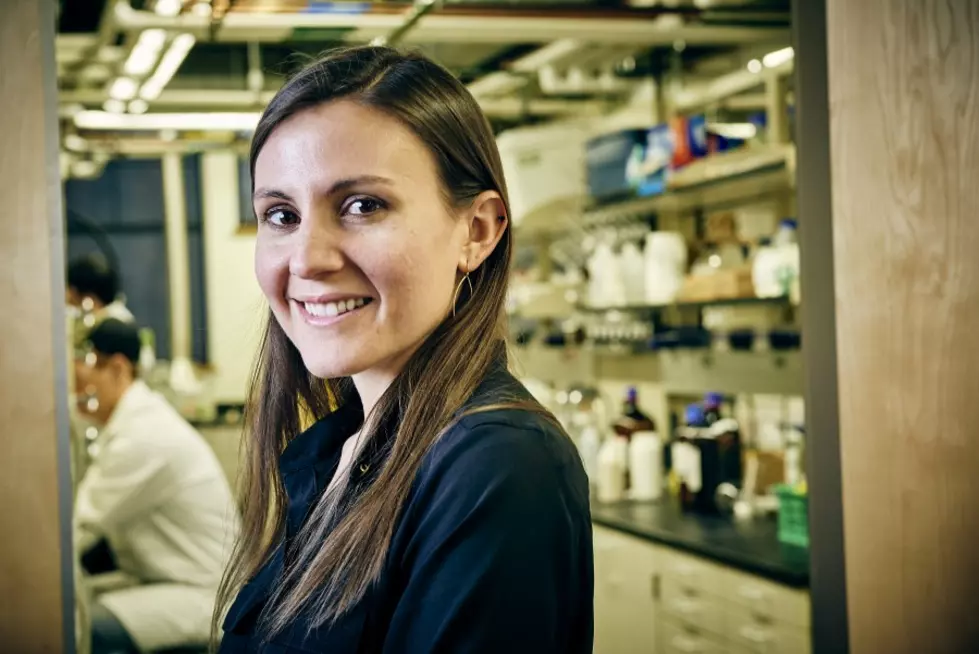
MSU organic chemist Sharon Neufeldt earns prestigious National Science Foundation CAREER award
BOZEMAN -- A Montana State University scientist who loves the art and logic it takes to solve the puzzles of organic chemistry has won the National Science Foundation's most prestigious award for developing young researchers.
The NSF’s Faculty Early Career Development Program, or CAREER, award will give Sharon Neufeldt $675,000 over five years and allow her to develop catalysts for more selective and efficient chemical reactions. It will also support her as she organizes activities and programs encouraging students at Chief Dull Knife College in Lame Deer to participate in research and develop skills in computational chemistry.
"The award will certainly help my research progress much more quickly because it supports some of my students," said Neufeldt, an assistant professor in the Department of Chemistry and Biochemistry in MSU's College of Letters and Science.
“Dr. Neufeldt is an outstanding scholar and teacher who directs an innovative organic chemistry research program involving graduate and undergraduate students, and this award will provide critical support for these efforts,” said Joan Broderick, head of MSU’s Department of Chemistry and Biochemistry.
Neufeldt explained that catalysts make chemical reactions easier without being consumed in the process. In some ways, she said, they are like gondolas that carry skiers to the top of a mountain. The skiers could hike, but riding is much faster and easier. And the gondolas continue to be useful even after one run.
Suppose, though, that bears and humans alike could board the gondolas, Neufeldt said. It wouldn't take long for the gondola operators to look for ways to make humans their only passengers.
In a similar vein, Neufeldt wants to figure out how to make catalysts discriminate between multiple possible interaction sites on a molecule. She will specifically address challenges in cross couplings, a type of chemical reaction that is already popular for making pharmaceuticals, agricultural chemicals and materials such as organic electronics. Cross couplings involve two different molecules, but sometimes those molecules have more than one site where a catalyst can interact.
"The result is a mixture of products that is associated with increased cost and waste," Neufeldt said.
The goal, Neufeldt said, is to save time, money and resources in the production of chemicals and materials. That will require both laboratory and computational work and the contributions of students in her research group, whose preliminary research was critical to the CAREER proposal Neufeldt submitted to the NSF. She currently supervises four doctoral students, one master's student and three undergraduates.
Neufeldt joined the MSU faculty in 2016 after working as a postdoctoral fellow at the University of California, Los Angeles. She earned her doctorate in chemistry at the University of Michigan in Ann Arbor and her bachelor's degree in chemistry at Northern Arizona University in Flagstaff.
"Sharon is a phenomenal and creative scientist, mentor and role model who is pursuing really important problems at the interface of experimental and computational chemistry," said Melanie Sanford, a renowned chemist who was Neufeldt's mentor at the University of Michigan.
“Her work is providing new insights about the selectivity of these reactions (cross couplings), which allows them to be performed with higher levels of precision in the complex settings that are most relevant to the rapid synthesis of new drugs and materials,” Sanford said.
Although Neufeldt was surprised to receive the NSF award on her first try, it was not the first honor for the Arizona native, who was homeschooled until age 12.
As a postdoctoral researcher, Neufeldt received UCLA's first Cram Teacher-Scholar Fellowship. The name refers to Donald J. Cram, one of three Nobel laureates in UCLA's chemistry and biochemistry department. Neufeldt also received UCLA's Hanson-Dow Teaching Award.
As a doctoral student, Neufeldt won the University of Michigan's Research Excellence Award and the University Regents Award. As an undergraduate, before graduating summa cum laude, she won the outstanding senior award in the College of Engineering and Natural Sciences, a Provost's Scholarship and a Hooper Undergraduate Research Fellowship, among other awards. While attending University High School in Tucson, Arizona, she earned a National Merit Scholarship.
As her career progresses, Neufeldt said her overarching research goal is to better understand how catalysts work and how humans can control what those catalysts do.
Neufeldt originally planned to study viruses in college, but said she fell in love with organic chemistry during her freshman year. As a result, she switched her focus from biochemistry to organic chemistry.
"In organic chemistry, everything is like putting together a puzzle. It's a combination of logic and art," Neufeldt said.
More From K96 FM
![Hillary Scott’s Daughter Has Time of Her Life Being Serenaded by Backstreet Boys [Watch]](http://townsquare.media/site/204/files/2019/02/Aj-McClean-BSB-Hillary-Scott-Daughter.jpg?w=980&q=75)







